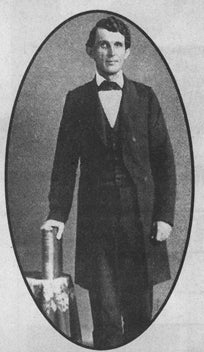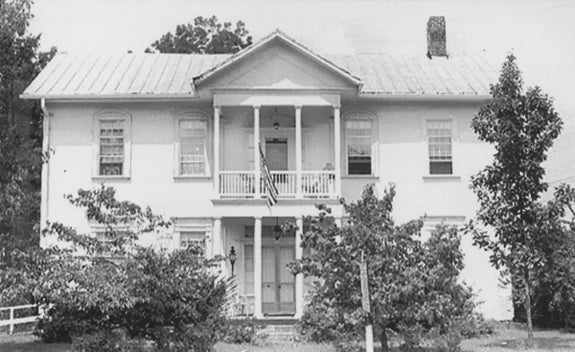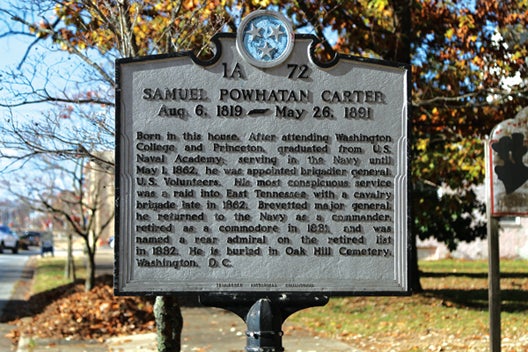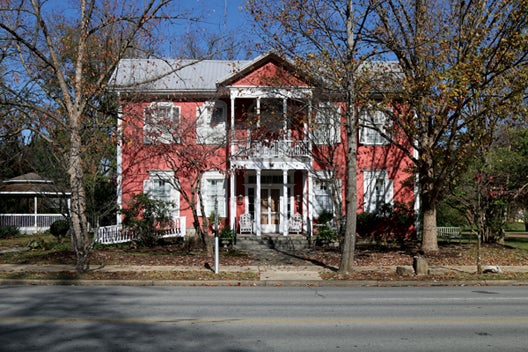Alfred Moore Carter House is a local historical gem
Published 4:15 pm Friday, November 27, 2020
|
Getting your Trinity Audio player ready...
|
For the second time in its 200-year-old history, the Alfred Moore Carter Home on E. Elk Avenue is for sale. Built in 1819, the two-story structure was reportedly designed by an architect from New Jersey.
The Greek Revival style house was more recently operated as Carter at Main Restaurant. The house is a plain two-story structure with large double-hinge windows, having 16 panes in the lower sash and 12 in the upper. The exterior walls are covered with tongued-and-grooved, hand-hewn, hand-planed boards, and there is a small two-story porch in front. The house features large spacious rooms with hand-carved doors, mantels, and window casings.
The foundation and chimneys of the home are constructed of very large bricks imported from England.
The home is located on the site of an old Indian village.
Originally, Elk Avenue in that part of town was known as Forge Street because it led to the first iron forge built west of the Allegheny Mountains. The forge, located at the foot of Lynn Mountain, was built by Landon Carter.
The house’s builder, Alfred Moore Carter, was a prosperous iron manufacturer, who was the eldest son of Landon Carter, and the grandson of John Carter, two of the original leaders of the Watauga Settlements in the 18th century. Alfred was the first circuit court clerk for Carter County, serving from 1810-1836, and was also a successful planter and merchant.
His son, Samuel P. Carter, for whom a historical marker out front honors, was born in the house. He was a career military officer and holds the distinction of being the only person to hold the rank of major general in the U.S. Army and rear admiral in the U.S. Navy. Most of his military career was spent in the Navy, but he was assigned to the Army during the Civil War because of his close connection with Union loyalists of East Tennessee after the state seceded from the Union.
The house has been an Elizabethton landmark from the very time it was built. Located in the Elizabethton Historical District, and built by the son of Elizabeth Carter, for whom Elizabethton is named, the house remained in the family for over 180 years — until it was sold to Linda Whitehead at an auction in 2002 as part of the estate of Dayton Albert Seiler.
Alfred Moore Carter as far as it is known was born Dec. 13, 1784 in the old Carter Mansion, located on Broad Street Ext.
He was married twice. First, he married Matilda M. Wendell on Nov. 3, 1820, who died on Feb. 14, 1816. His second wife was Evalina B. Parry (perry) of Staunton, Va., who was of the family of which Commodore Perry belonged. Carter was the father of six children— three by his first wife, and three by his second wife.
Among his sons were Samuel P. Carter, William Blount Carter, and James P.T. Carter, all of whom took an active part in the Union cause during the Civil War.
Alfred Moore Carter was educated at Washington College under Rev. Samuel Doak. He was a well-to-do iron manufacturer, a planter, merchant, public official, and his influence in the town was great. Like his father and grandfather, he was energetic, patriotic, brave and public-spirited.
Alfred was the most prominent of Landon Carter’s sons. By 19th Century standards, the Carter family was quite wealthy.
Upon the death of Alfred Moore Carter’s widow, the house passed to Admiral Samuel P. Carter, the eldest son of Alfred Moore Carter. Samuel Carter spent two years at Princeton University and graduated in the first class from the U.S. Naval Academy, Annapolis, and became a naval officer.
In the War Between the States, he was detached from the Navy and appointed Brigadier General by President Lincoln and sent for special duty to East Tennessee to organize a camp of instruction of United States volunteers. He was Provost Marshal of Kentucky, Tennessee, and Ohio, and became Brevit Major General.
At the close of the war he returned to his first love — the Navy — and was promoted to Commander, Captain, Commodore and served as commandant of Midshipmen at the Naval Academy, and became Rear Admiral.
Upon the death of Samuel Carter, the house passed to his brother, W.B. Carter, who on March 26, 1902, made a deed for the property to his granddaughters, Mollie M. Hunter and Carrie N. Hunter, heirs at law of Mrs. Carrie E. Carter Hunter. Carrie was a daughter of William B. Carter and was married to Dayton Hunter, a prominent Elizabethton attorney.
Mrs. Mollie Seiler, who died in 1977, had lived in the house since 1902. Her husband, J. Frank Seiler, was a prominent Elizabethton lawyer. They were the parents of Dayton Albert Seiler.
The Alfred Moore Carter House has some colorful history behind it — especially Civil War history. Rev. William B. Carter, a minister and son of Alfred Moore Carter, was among those who instigated the famous bridge burnings in this section.
William Blount Carter was a Princeton graduate, a Presbyterian minister, and farmer. A congressman for several terms, he was also a delegate to a Tennessee Constitutional Convention.
Rev. Carter went to Washington, D.C. in 1861 to present President Lincoln with a scheme to burn railroad bridges in the southern states. Carter returned to Elizabethton and apparently felt that being a pastor was a good cover, so he went back to the ministry, and conducted services on Sunday for local churches and Confederate troops, while organizing a group of people to burn railroad bridges.
The Carter House served as a headquarters for the bridge burners. An account of a meeting in the “History of the 13th Regiment Tennessee Volunteer Cavalry” tells of a planning session in the west room of the home and of Dr. Abraham Jobe later coming to the home to seek an intervention by Mrs. Evaline Hunter to stop the plot.
The result was Carter’s Raid in which two most important railroad bridges over the Holston and Watauga Rivers were burned, railroad tracks were torn up, and telegraph equipment destroyed.
The Carters were only one of many loyal Southern families who felt the full weight of the Civil War thanks to a deep love of the national Union. By their tenacity and courage they made a unique contribution to the war effort.
After the war, Rev. W.B. Carter returned to his native Elizabethton where he lived a quiet life. He died in 1902, a much respected member of the community.
The Carter County Commission has indicated interest in buying the house and property, and there is some under rumblings that the state might be interested due to the history associated with the house.
The Alfred Moore Carter House is a most unique Elizabethton historical treasure.










